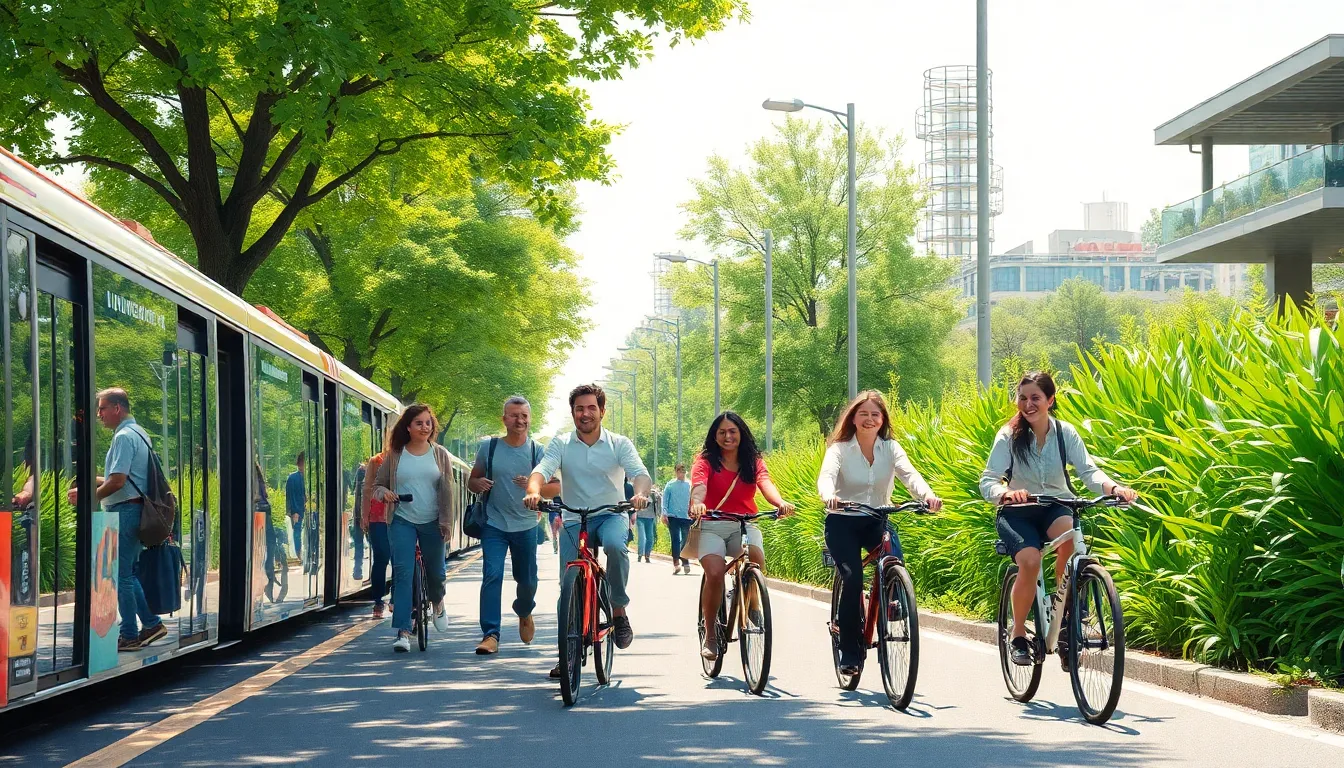In a world where plastic seems to outnumber people, sustainable living isn’t just a trendy hashtag; it’s a necessity. Imagine a planet where trees aren’t just props in Instagram photos but actual lungs of the Earth. Sustainable living is the superhero cape that helps protect our environment from the villains of waste and pollution.
Choosing a sustainable lifestyle not only saves the planet but also saves money. Yes, that’s right! Who knew being eco-friendly could make wallets fatter? From reducing energy bills to embracing local produce, living sustainably can be both rewarding and wallet-friendly. So strap in as we dive into why making greener choices is not just important but downright essential for a thriving future.
Why Is Sustainable Living Important
Sustainable living focuses on minimizing environmental impact and promoting harmony with natural ecosystems. It involves making choices that benefit the planet and ensure resources remain available for future generations.
Definition of Sustainable Living
Sustainable living refers to a lifestyle that reduces an individual’s or society’s use of the Earth’s natural resources. This approach fosters an environment where ecosystems thrive, and resources regenerate. Practices such as reducing waste, utilizing renewable energy, and supporting local economies illustrate sustainable living. Adopting eco-friendly habits contributes to a healthier planet and a sustainable future. Communities that prioritize sustainability often experience enhanced quality of life and stronger connections among residents.
Key Principles of Sustainability
Sustainability revolves around three core principles: environmental protection, economic vitality, and social equity. Environmental protection emphasizes responsible stewardship of the planet’s resources. Economic vitality focuses on fostering resilient economies that support local jobs and industries. Social equity ensures fair access to resources and opportunities for all community members. By integrating these principles, individuals contribute to a balanced approach that addresses today’s needs without compromising the future. Practices like reducing consumption, recycling, and promoting social justice resonate with these key sustainability principles.
Environmental Benefits

Sustainable living offers numerous environmental benefits that significantly impact the health of our planet. By adopting eco-friendly practices, individuals contribute positively to global ecosystems.
Reduction of Carbon Footprint
Reducing the carbon footprint plays a vital role in combating climate change. Sustainable living includes choices like utilizing public transportation, biking, or walking instead of driving. Engaging in these practices lessens greenhouse gas emissions. Eating locally grown foods also minimizes emissions associated with transportation. Furthermore, renewable energy sources such as solar and wind power help decrease reliance on fossil fuels, further reducing carbon footprints.
Preservation of Natural Resources
Preserving natural resources ensures that future generations have access to vital elements. Sustainable living emphasizes responsible consumption and promotes recycling and repurposing materials. Water conservation techniques, like using low-flow fixtures and rainwater harvesting, protect freshwater supplies. Reducing waste through composting enriches soil and decreases landfill usage. Additionally, supporting sustainable agriculture leads to healthier soil and biodiversity, fostering a more resilient and thriving ecosystem.
Economic Advantages
The economic benefits of sustainable living extend far beyond environmental impact. Individuals and communities experience significant financial advantages through eco-friendly choices.
Cost Savings Through Sustainable Practices
Implementing sustainable practices leads to substantial cost savings. Lower energy bills result from utilizing renewable energy sources, such as solar panels and wind turbines. Reducing water consumption also significantly cuts expenses, as efficient appliances and smart usage strategies lower utility costs. In addition, buying local produce often proves more affordable compared to imported goods, reducing transportation expenses. Simple habits like recycling and composting can minimize waste disposal fees, adding another layer of savings. Consequently, adopting sustainable habits creates a financially advantageous lifestyle.
Job Creation in Green Industries
Sustainable living spurs job growth in various green industries. Transitioning to renewable energy requires a skilled workforce, creating jobs in solar, wind, and bioenergy sectors. Additionally, sustainable agriculture practices lead to increased demand for local farmers and supportive services, boosting local economies. The development of eco-friendly products fosters innovation and opens new markets, resulting in more employment opportunities. Overall, the shift towards sustainability contributes to the emergence of diverse job prospects, supporting both economic vitality and environmental well-being.
Social Impact
Sustainable living significantly influences social dimensions, enhancing community health, resilience, and equity.
Improvement of Health and Well-being
Health benefits arise from sustainable practices that emphasize cleaner air and reduced pollution. Nutrition improves when individuals choose locally sourced foods, leading to healthier diets. Access to green spaces enhances physical and mental health by promoting outdoor activities. Communities that prioritize sustainability often experience a decline in respiratory diseases and related ailments. Various studies confirm that neighborhoods focused on eco-friendly initiatives report higher overall well-being among residents.
Strengthening Communities
Strengthened community ties emerge when individuals engage in sustainable practices together. Local initiatives, such as community gardens and co-op markets, foster collaboration and trust among residents. Participation in sustainable programs cultivates a sense of belonging and shared responsibility. Economic support flows from collective efforts, promoting local businesses and stimulating job creation. Volunteering in sustainability projects further connects individuals, reinforcing social networks and enhancing community cohesion.
Challenges to Sustainable Living
Sustainable living faces significant challenges that hinder its widespread adoption. Identifying these barriers and misconceptions helps individuals make informed choices.
Barriers to Adoption
Barriers to adopting sustainable living often include financial constraints and lack of awareness. Many individuals perceive eco-friendly products as more expensive, which discourages them from making the switch. Limited access to sustainable resources also complicates this process. Some communities lack the infrastructure for recycling or renewable energy options. Additionally, busy lifestyles lead to convenience-based choices, overshadowing sustainable alternatives. Furthermore, education about sustainable practices remains insufficient in many areas, leaving individuals unaware of their options.
Common Misconceptions
Common misconceptions about sustainable living further impede progress. Some believe that living sustainably requires a complete lifestyle overhaul, which seems overwhelming. Others think that only large corporations can make a significant impact. Many underestimate the power of individual actions, such as reducing waste or conserving energy. Misunderstandings about the effectiveness of recycling persist, leading to skepticism about its benefits. Lastly, some view sustainable practices as trendy or temporary, rather than essential for long-term environmental health.
Conclusion
Sustainable living is a vital approach that fosters a healthier planet and promotes economic resilience. By embracing eco-friendly choices individuals not only reduce their environmental impact but also contribute to the well-being of their communities. The interconnectedness of environmental protection, economic vitality, and social equity highlights the importance of adopting sustainable practices.
As awareness grows and barriers are addressed more people can participate in this movement. Every small action counts and collectively they lead to significant change. A commitment to sustainability ensures that future generations inherit a thriving planet with abundant resources. The journey toward sustainable living is not just beneficial; it’s essential for a balanced and equitable future.

